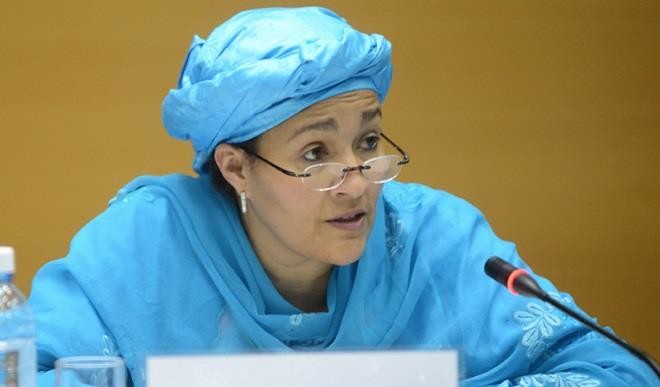The Deputy Secretary-General of the United Nations, Amina Mohammed, has commended the move to tackle hate speech but voiced opposition to death penalty.
Mohammed, who is the former Minister of Environment, said this at the State House after leading a delegation to pay a courtesy call on President Muhammadu Buhari.
Asked whether she subscribed to the idea of social media censorship as proposed by the Nigerian government, she said, “we need to know that globally, we are in a space that hate speech has reached an all-time high and so many checks and balances we can put into the society, into a country, into a region to bring an end to that is welcome.
“Again, the way the legislation is being followed to try to put that in place, I think is commendable. We, of course, did not support the death penalty and I am also happy to see yesterday (Monday) that that portion was taken out of the legislation that was being put forward. The Secretary-General had also put in place a special ending on hate speech.
“So, there is a strategy for that now and we are looking at that globally. I think this framework is important for multilateralism and we can go much further if we do these things together; many of these issues are across borders through technologies.”
Mohammed said the meeting was used to express appreciation of the Secretary-General to the present leadership not only in the country but within the region in view of the challenges of conflict, climate change and political issues around elections.
She said the meeting touched the humanitarian crisis that had stretched across from the North East to the North West and the UN support.
She voiced the support of the UN to a bill presently before the National Assembly on gender-based inequality, describing it as a very important law that would receive non-partisan support across the board because of the need to bring an end to violence against women.
“There is the EU-UN project which actually addresses gender-based violence and Nigeria is a recipient of some of that funding and would soon be launched here in the country and I would be there to give the support.
“It’s not for the national level but how we would domesticate that in all the tiers of government so that you have a truly national response to laws when it comes to implementing them,” she said.
Mohammed backed the need to bridge the technological gap between developed and developing countries through the migration to 5G.
She, however, stressed the need to put in place checks and balances to ensure that it did do any harm to people because of the threat of hate speech.
“It’s a good side to technology; there is a side that is not too good. Of course, telecommunications is incredibly important. It’s important that we have 5G, it is incredibly fast technology. But at the same time, we have to make sure that the climate footprint is recognised because 5G comes with enormous usage of water and also power.
“And in both cases, we have to find ways to balance that so that you are profiting from the technology but not at the expense of the environment which you know now that climate change is a big part of our existential threat,” she added.

 Join Daily Trust WhatsApp Community For Quick Access To News and Happenings Around You.
Join Daily Trust WhatsApp Community For Quick Access To News and Happenings Around You.


